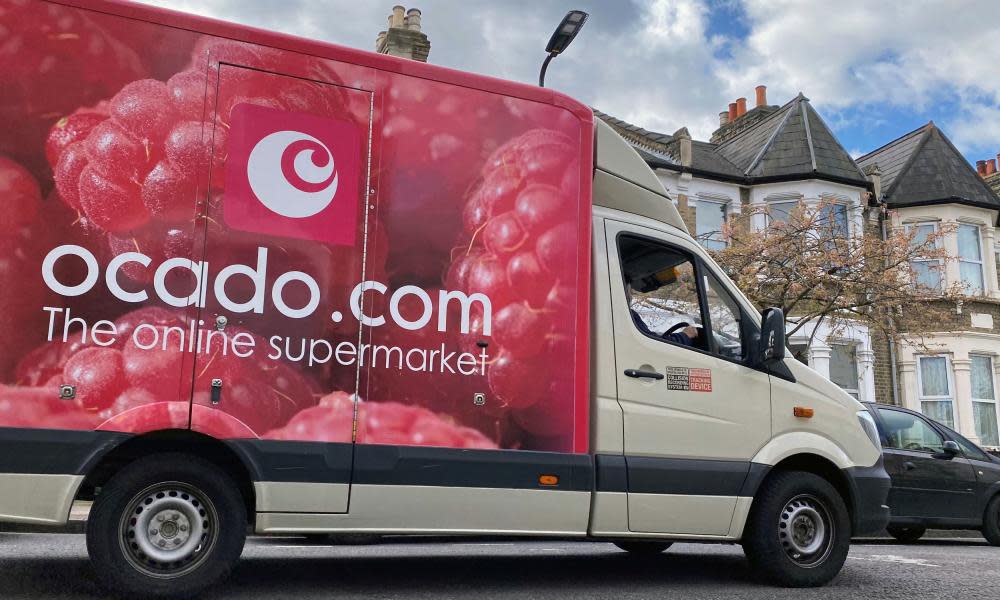Ocado share price soars as UK shifts to online grocery shopping

It may account for less than 2% of the groceries sold in the UK compared to Tesco’s near 27% share of the nation’s food shopping, but the stock market value of 20-year-old Ocado is now greater than that of the 100-year-old supermarket giant – a change that could reflect the future of the weekly shop.
A sharp increase in the speed of the shift to online shopping during the coronavirus pandemic has pushed up Ocado’s share price by 155% since March. As a result it is now valued at £21bn, compared to Tesco’s £20.9bn, even though Tesco delivers far more food to Britain’s doorsteps.
Before the coronavirus crisis, just 7% of grocery sales were online, but lockdown has changed habits fast to raise that to 12.5%.
Ocado delivered a bumper 52% rise in its sales in the three months to the end of August, scotching concerns about its retail arm’s switch from long-term partner Waitrose to Marks & Spencer.
The limited options available for those who want to invest in the online grocery business are part of the reason for Ocado’s share price take-off. Most online specialists, including meal kit suppliers such as Mindful Chef and delivery box brands such as Abel & Cole or Riverford, remain in private hands.
Ocado’s share price first took off in November 2017 when, after years of delays, it inked its first deal to supply its own hi-tech grocery delivery technology overseas.
That technology is the major difference between Ocado and its rivals: while Tesco, Sainsbury and Asda are still collecting most of their customers’ internet orders from inside their stores, Ocado has cutting-edge, robot-operated picking centres.
The first deal, with Groupe Casino in France, has been followed by eight others, ranging from Kroger in the US to Aeon in Japan.
As a result, investors have reassessed Ocado. It is no longer viewed as a grocery delivery business but as a tech stock – something akin to Amazon with the potential for vast overseas expansion, rather than the relatively limited opportunities of UK food shopping.
James Lockyer, an analyst at Peel Hunt, who described Ocado as the “Microsoft of retail” in a 2018 note, flagged that it has not even started to book the earnings from the overseas deals already sealed. “It is all about future potential,” he said.
As Ocado investors dream of a technological future, Tesco’s share price has stagnated. Strong sales during the pandemic have not translated into a surge in profits as the need for extra staff, protective equipment and home delivery have all weighed on costs.
Tesco’s online sales have increased dramatically – at a much faster pace and total value than for tiny Ocado – but there is scepticism about the profitability of those sales. Clive Black, an analyst at Shore Capital, said Tesco’s share price has also been weighed down by “worries about price wars”.
Some analysts believe the sales growth seen in the last six months is a one-off occurrence during the pandemic that will be unwound. Black, however, thinks this year’s change is more permanent. “We think that working from home, the collapse of [eating out] represents a step change, not just this year but ongoing,” he said.
Meanwhile, some point out that Ocado is quite different from other tech stocks because its international expansion will take years to realise. It is not just about selling digital clicks, because warehouses and sorting equipment take time to build and adapt for different retailers around the world.
The first warehouses – designed for Casino and Canada’s Sobey’s – have only opened this year, two and three years after the deals were signed, but investors and analysts have already pencilled in the likely earnings from those deals and others.
Ocado’s technology, however, is not nimble and reactive. In the UK this summer, Tesco, Waitrose and Sainsbury’s were able to dramatically and rapidly expand their online businesses at low cost, hiring thousands of new staff within weeks and using their stores as sites to pick and pack groceries for home delivery.
Morrisons, whose online business is driven by Ocado, did rapid additional deals with Amazon, because Ocado was not able to provide instant extra capacity.
Black reckons Ocado’s valuation has gone too far: “The sort of earnings that Ocado needs to do to justify its current valuation are light years away if ever. That’s what’s perplexing.”

 Yahoo News
Yahoo News 
